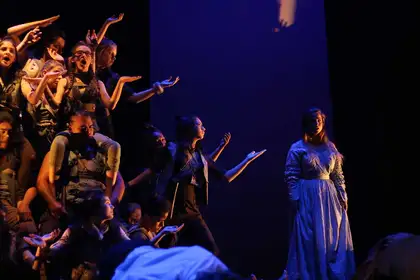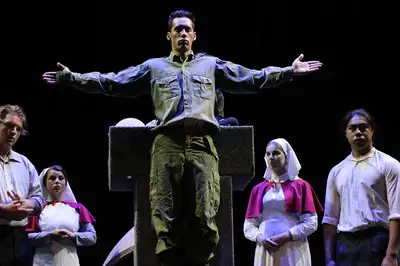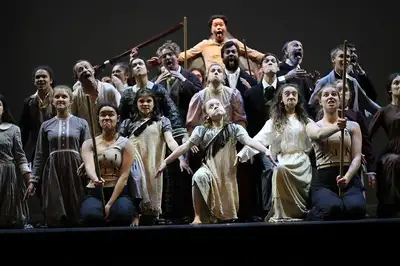
A scene from Dog & Bone - one of the four plays in The Undertow (photo credit/Aneta Pond).
Countering “cultural amnesia” with provocative, entertaining theatre that exposes multiple truths of Aotearoa's turbulent history is how Te Rākau Theatre artistic director Jim Moriarty describes the work of The Undertow – a four-play epic currently being performed in Wellington.
He says theatre fans, and those who have never seen live theatre, have been blown away by the power and passion of the performances currently being performed at Te Papa Museum’s Soundings Theatre.
He hopes more will take the chance to participate in the final days of the current season, which is supported by Massey University’s College of Humanities and Social Sciences.
The Undertow tackles major historical moments in our collective stories: from the settlement of Port Nicholson and the Owhiro Coast, to the battle of Passchendaele and the Vietnam war, to current day urban development.
It is comprised of four funny, moving and deeply powerful plays about Wellington and Aotearoa’s bicultural history performed by a cast and crew of 50, directed by Mr Moriarty and written by Massey psychology graduate Helen Pearse-Otene for Te Rākau Theatre, New Zealand’s longest-running Māori theatre company.
Nearing the end of its successful Wellington season, the first two plays will be performed this Wednesday and Friday, with the third and fourth plays on Thursday and Saturday nights. Sunday offers a unique opportunity to see all four plays in one day as a theatre marathon, starting at 1pm.
Psychology thesis transformed into theatre
Helen Pearse-Otene wrote all four plays and the final one, The Land-Eaters, as part of her Master of Psychology thesis at Massey University. Parts of the play are based on extensive interviews she did with Vietnam War veterans, which she drew on for her academic research within a psychology framework to address creativity and narrative as therapeutic tools.
The first of the plays, The Ragged is set in Wellington’s Port Nicholson in 1840 and explores the early relationships between settlers, the New Zealand Company, and tangata whenua as the settlers try to find their own place to call home.
The second, Dog & Bone, takes place in during the Taranaki Land Wars in 1869. In writing it Ms Pearse-Otene conducted extensive research using settlers’ and Armed Constabulary diaries, newspaper articles, and ngā kupu tuku iho (oral histories) of local Iwi to maintain the integrity of the play’s cultural background.
In Public Works she examines how the Public Works Act in 1917 stripped the rights and land of Māori soldiers while they are in Europe fighting for King and Country, and delves into the psyche of soldiers and nurses in WWI.
In The Land-Eaters the scene is 2017 and focuses on how one man’s quest to develop land on Wellington’s south coast clashes with the fate of an ancient tree and a the former land-owner – and mana whenua (territorial rights) – who has taken up residence there.

A scene from Public Works, from The Undertow quartet (photo credit/Aneta Pond).

A scene from The Ragged, the first of four plays from The Undertow (photo credit/Aneta Pond).
Facing the truth of the human condition
Mr Moriarty says The Undertow sets out to tell New Zealand stories beyond the “dominant narrative” with “respect, grace and dignity”, not to lay blame or stir guilt. There are “goodies and baddies” across all parties and players, he says. “It’s all about the human condition and theatre can help us face up to and deal with uncomfortable truths.”
High school audiences who've seen individual plays, he says, ask him; ‘why aren’t we learning about this at school?’
Associate Professor Elspeth Tilley, from the School of English and Media Studies at the University’s Wellington campus, has worked in partnership with Te Rakau in the development of the production for the past three years while it has been the Theatre Company in Residence at the campus. The Undertow series has been six years in the making.
The University provides Te Rākau with rehearsal space and access to specialised theatre facilities for development performances, she says. Three of the four plays have had development showings at Massey’s Wellington campus, enabling staff and students to learn from seeing them work-shopped and revised through the development process.
“Both Helen and Jim are regular contributors to the Massey expressive arts curriculum as guest lecturers. By holding open rehearsals on campus, Massey Expressive Arts students in Wellington can drop in to see Jim, The Undertow’s award-winning director, in action.”
Dr Tilley says the school is “grateful for the opportunity to support an epic theatre event that illuminates Aotearoa history and identity, explores biculturalism, and demonstrates the importance of creativity and the arts to negotiating coexistence and honouring Te Tiriti o Waitangi.
“In our 55-year history of teaching theatre in the College of Humanities and Social Sciences we have always striven to demonstrate how theatre contributes to justice, awakening and knowledge of self and others in ways that no other art form can. Nothing could exemplify this better than The Undertow, with its encounters of difference, its powerful and poignant writing and its vivacity as brought to life by the compelling directorial vision of Jim Moriarty,” Dr Tilley says.
University support for expressive arts that challenges us
Mr Moriarty says Massey’s support exemplifies the vital role of a university in championing creative ways to explore critical issues that help the wider community – Pākehā, Māori and new migrants – to understand their society. With the increase in migrants settling in this country, it is important that our collective cultural stories are widely shared, and theatre is a key vehicle for this, he adds.
He hopes to be able to tour the production in New Zealand as well as internationally, as the stories express universal truths about humanity, and he is keen to connect with sponsors.
Tickets are available from Ticketek here. More information on Te Rakau’s production of The Undertow.